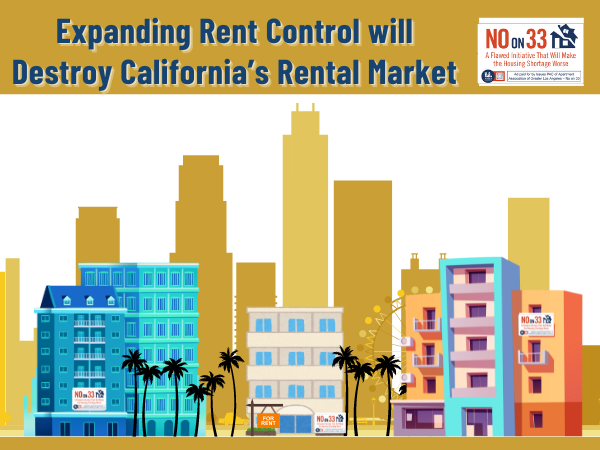NO on 33: Expanding Rent Control will Destroy California’s Rental Market

From the Southern California News Group Editorial Board
Here they go again. Left-wing activists in 2018 and 2020 tried to convince Californians to support a statewide initiative that would usher in the most extreme rent-control measures imaginable. Despite the state’s Democratic political tilt, voters wisely rejected this poison – by 19 and 20 points respectively. The same controversial group, the AIDS Healthcare Foundation, apparently has money to burn and is back with a similar measure in November. Like previous ones, Proposition 33 would overturn the Costa-Hawkins Rental Housing Act. That law is – and we’re not exaggerating – the only limit keeping California localities from imposing the kind of attacks on property rights found in socialist regimes.
California already has statewide rent control that limits increases to 5 percent a year plus inflation (capped at 10 percent). Cities such as San Francisco and Santa Monica impose stricter controls. This Editorial Board strongly opposes rent control because it distorts the market, reduces supply and obliterates property rights. The marketplace works for housing as it does for everything else – provided government doesn’t make a mess of it.
Unfortunately, government construction restrictions have caused the housing shortages that drive up rent prices to absurd levels. We understand why Californians are frustrated by rising rents, but slapping price controls on rents discourages investors from building new apartments, causes them to delay maintenance and encourages them to turn them into owner-occupied properties. Although it artificially lowers rents for some tenants, rent control drives up the overall cost of rents in a city. Recent studies suggest it reduces housing supply by as much as 15 percent.
Californians should contemplate how bad things will get if the state eliminates Costa-Hawkins. As the Legislative Analyst’s Office explains, that 1995 law exempted single-family homes and units constructed after 1995 and forbade “vacancy controls.” Currently, landlords can adjust the rent to market rates after a tenant vacates the property. With vacancy controls, the government would dictate what owners could charge a new tenant.
What happens if a property owner is losing money and is not allowed to raise the rent or adjust rents upon vacancy? We asked that question to Proposition 33’s supporters during a recent editorial-board meeting. Those owners would have a process to appeal to an administrative law judge for the right to charge a rental price that enabled them to make a slim profit. Creepy stuff.
One supporter told us he supported repeal of the Ellis Act, which allows owners to evict tenants if they want to exit the [rental housing] business. Although this initiative doesn’t address that act, its repeal along with passage of Proposition 33 would mean landlords could be forced to remain in a money losing business against their will. With Proposition 33, cities would be free to regulate your single-family house – making it virtually impossible to evict a tenant so you can move back in.
Supporters of Proposition 33 downplay those scenarios. They say it’s only about giving cities the ability to pass rent-control measures that are tailored to the local situation. But we have a good idea how liberally run cities will react. There will be few limits. If the measure passes, we expect a mad rush out of the rental business.
Voters can again stop the madness before it starts by voting “no” vote on Proposition 33.
